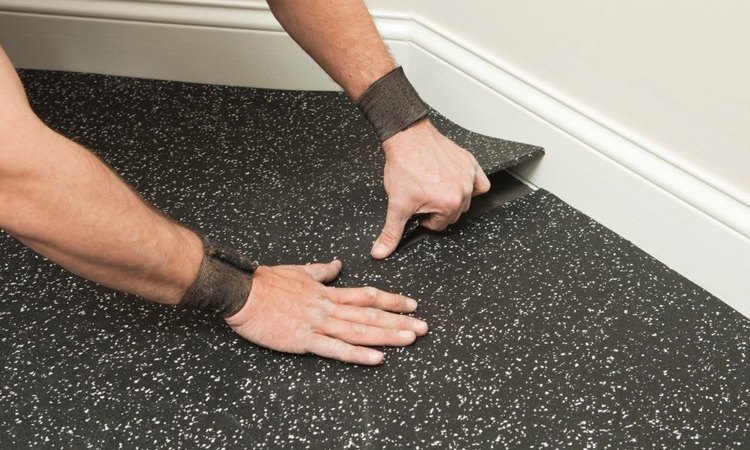Transform your garage quickly and simply with rubber garage flooring
Revamping your garage floor can be a game-changer for both aesthetics and functionality. While many homeowners consider options like home depot vinyl flooring or hardwood flooring for their living spaces, rubber garage flooring offers a unique and practical solution for your garage. This durable and versatile material can transform your space quickly and easily, providing a host of benefits that make it an attractive choice for garage renovations.

Why Choose Rubber Flooring for Your Garage?
Rubber garage flooring has gained popularity due to its numerous advantages. Unlike traditional concrete floors, rubber provides a cushioned surface that’s comfortable to walk and stand on for extended periods. It also offers excellent slip resistance, making it safer for both wet and dry conditions. Additionally, rubber flooring is highly durable, capable of withstanding heavy loads, chemical spills, and temperature fluctuations common in garage environments.
How Does Rubber Flooring Compare to Other Options?
When considering garage floor coatings, it’s essential to compare rubber flooring to other popular choices. While home depot vinyl flooring and hardwood flooring are excellent for indoor living spaces, they may not be suitable for garage conditions. Rubber flooring outperforms these options in terms of durability, moisture resistance, and ease of maintenance in a garage setting. It also provides better sound insulation and shock absorption, which can be beneficial if you use your garage as a workshop.
What Are the Different Types of Rubber Garage Flooring?
Rubber garage flooring comes in various forms to suit different needs and preferences. The most common types include:
-
Interlocking tiles: Easy to install and replace individual sections if needed.
-
Roll-out mats: Ideal for covering large areas quickly with minimal seams.
-
Peel-and-stick tiles: Offer a more permanent solution with adhesive backing.
-
Recycled rubber flooring: An eco-friendly option made from repurposed materials.
Each type has its own set of advantages, allowing you to choose the best fit for your specific garage requirements.
How Easy Is It to Install Rubber Garage Flooring?
One of the most appealing aspects of rubber garage flooring is its ease of installation. Unlike epoxy coatings or tile installations that require extensive preparation and professional help, many rubber flooring options are designed for DIY installation. Interlocking tiles, for example, can be laid down without adhesives, allowing for a quick and simple transformation of your garage floor. Roll-out mats can cover large areas in minutes, while peel-and-stick tiles offer a more permanent solution that most homeowners can handle with basic tools and some patience.
What Maintenance Does Rubber Garage Flooring Require?
In the United Kingdom, where weather conditions can be unpredictable, having a low-maintenance garage floor is particularly valuable. Rubber garage flooring excels in this area, requiring minimal upkeep to maintain its appearance and functionality. Regular sweeping or vacuuming is usually sufficient to keep the surface clean. For more thorough cleaning, a damp mop with mild soap and water can effectively remove dirt and stains. Unlike concrete floors that may require periodic resealing or epoxy coatings that can chip and require touch-ups, rubber flooring maintains its integrity with simple care routines.
How Much Does Rubber Garage Flooring Cost?
When considering rubber garage flooring, it’s important to understand the cost implications. Rubber garage flooring prices can vary depending on the type, quality, and quantity needed. Here’s a comparison of average costs for different rubber flooring options:
| Product Type | Average Cost per Square Foot | Installation Difficulty |
|---|---|---|
| Interlocking Tiles | £2.50 - £5.00 | Easy (DIY-friendly) |
| Roll-Out Mats | £1.50 - £4.00 | Very Easy (DIY-friendly) |
| Peel-and-Stick Tiles | £3.00 - £6.00 | Moderate (DIY possible) |
| Recycled Rubber | £2.00 - £4.50 | Easy to Moderate |
Prices, rates, or cost estimates mentioned in this article are based on the latest available information but may change over time. Independent research is advised before making financial decisions.
While the initial cost of rubber garage flooring may be higher than a simple concrete sealer or paint, it often proves more cost-effective in the long run due to its durability and low maintenance requirements. Additionally, the ease of installation can save on labour costs if you choose to do it yourself.
In conclusion, rubber garage flooring offers a quick and simple way to transform your garage space. Its combination of durability, ease of installation, and low maintenance makes it an attractive option for many homeowners. Whether you’re looking to create a more comfortable workspace or simply want to upgrade the appearance of your garage, rubber flooring provides a versatile solution that can meet a variety of needs and preferences.




